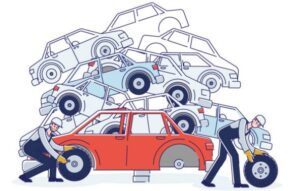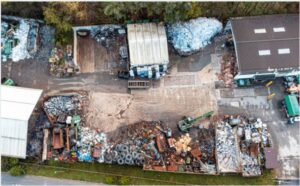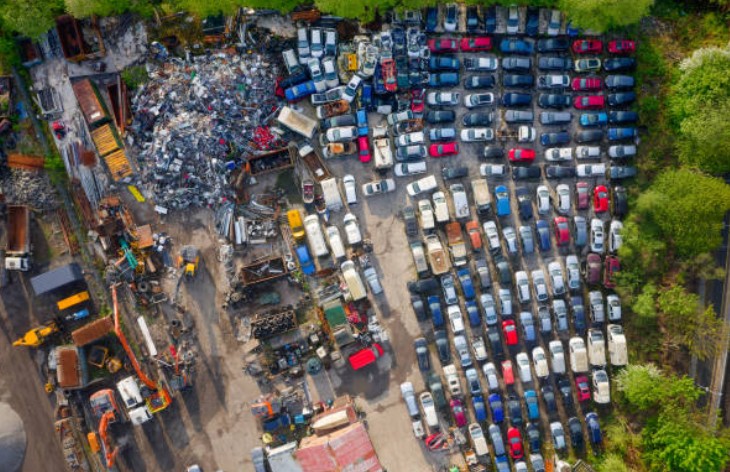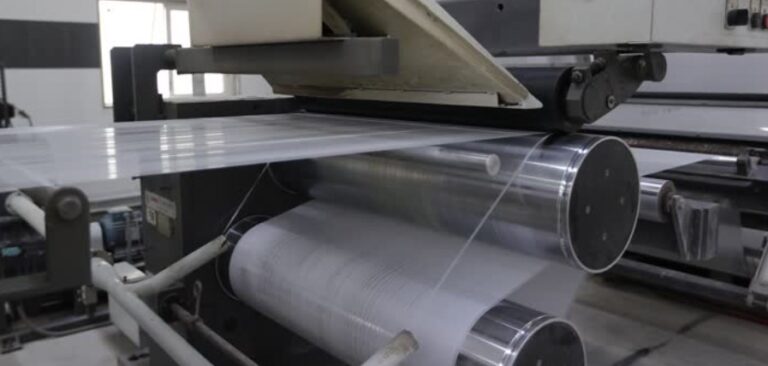The Impact of Car Scrappage on the UK Auto Industry: A Comprehensive Analysis
Car scrappage schemes have transformed the UK auto industry by encouraging the rapid turnover of older vehicles in exchange for incentives towards new ones. This replacement of older cars has significant environmental and economic impacts. By enabling the transition to cleaner and more efficient vehicles, the initiative has substantially boosted new car sales and stimulated the UK’s automotive market.
You’re likely aware that these schemes are designed to reduce carbon emissions, as older vehicles tend to be less fuel-efficient. With around 85% of a vehicle’s lifetime CO2 emissions occurring during their use, replacing outdated models indeed helps mitigate environmental impact. The program has proved beneficial, aiming to cut down millions of tonnes in emissions while invigorating the consumer appetite for newer vehicles.
There is, however, a nuanced impact on classic car enthusiasts in the UK. The scrappage initiative has sometimes resulted in the loss of vintage cars, many of which are now considered valuable to collectors. Exploring the balance between environmental benefits and cultural losses presents an intriguing perspective on this scheme’s broader implications.
Understanding Car Scrappage and Its Role in the Industry
The UK car scrappage scheme offers incentives for trading in older vehicles, impacting various aspects of the automotive industry. These schemes contribute to reducing emissions, supporting car manufacturers, and influencing the supply and demand dynamics within the market.
What Car Scrappage Schemes Are and How They Work?

Car scrappage schemes are designed to encourage motorists to retire their aging, high-emission vehicles. Participants receive financial incentives, such as discounts or credits, towards purchasing new, eco-friendly cars. The primary goal is to lower pollution levels and boost the sales of cleaner vehicles.
Manufacturers and the government often work together on these initiatives, providing shared resources to maximize their reach and impact. Dealers play a key role, offering incentives at the point of sale. By targeting older models, the scheme helps reduce the number of high-emission vehicles on the roads, contributing to broader environmental objectives.
The History of Car Scrappage in the UK
The UK introduced its first major car scrappage scheme in 2009 during the global financial crisis. At that time, the scheme was meant to spur demand in the struggling automotive sector by removing outdated stock from circulation. Participants who scrapped vehicles more than ten years old received a £2,000 grant towards a new car purchase.
Further schemes have been explored over the years but on a smaller scale. Each initiative aimed to modernize the UK vehicle fleet cut emissions, and stimulate economic growth within the car manufacturing sector. By supporting both environmental and industrial objectives, these schemes continue to shape the dynamics of the UK’s automotive market.
How Does Scrappage Affect New Car Sales?

Car scrappage schemes have a significant impact on new car sales and the broader economy. These initiatives often lead to increased demand for new vehicles and contribute positively to economic growth by stimulating the motor industry.
The Relationship Between Scrappage Incentives and Car Demand
Scrappage incentives play a critical role in boosting demand for new cars. By offering financial benefits for trading in older vehicles, these programs encourage consumers to purchase new models. This increase in new car sales can be attributed to the attractive discounts that make upgrading more financially feasible.
New car registrations often see a marked increase during periods when scrappage schemes are active. The incentives attract not only those who are considering a new purchase but also individuals who might not have planned to buy a new vehicle. The introduction of a scrappage incentive typically leads to a surge in car sales figures, as consumers seize the opportunity to acquire newer models at reduced costs. This shift effectively accelerates the cycle of car ownership, providing a boost to manufacturers.
How Scrappage Schemes Boost the Economy?
Scrappage schemes contribute to economic growth by stimulating the motor industry. With increased demand for new cars, manufacturers ramp up production, resulting in more jobs within the sector. This economic ripple effect extends to ancillary industries, such as auto parts suppliers and transport services.
These programs also encourage technological advancements, pushing manufacturers to design vehicles that meet environmental and safety standards. As older cars are removed from the roads, the overall carbon footprint of the vehicle population is reduced, benefiting not just the motor industry but also society.
In summary, scrappage schemes have a multifaceted impact, invigorating car sales and contributing to broader economic health.
The Environmental and Sustainability Impact
The car scrappage process impacts the environment by reducing emissions and waste. It also encourages the production and use of greener vehicles through various recycling practices and schemes.
How Car Recycling Reduces Waste and Emissions?

Car recycling is an effective method to decrease waste and limit CO2 emissions. By recycling vehicles, a significant percentage of materials, such as metals and plastics, are repurposed, reducing the need for new raw materials. Scrapping old cars, via a website like Car.co.uk, ensures that approximately 95% of the vehicle components are recycled, which cuts down on landfill use and manufacturing demands.
Moreover, recycling reduces the energy required for producing new car materials, which plays a part in decreasing industrial emissions. This conservation of resources not only lessens the carbon footprint of new vehicle production but also promotes a more sustainable approach to managing automotive waste. Through these activities, the environmental impact is significantly reduced.
The Role of Scrappage in Promoting Greener Vehicles
Scrappage schemes have a pivotal role in advancing the adoption of more environmentally friendly vehicles. By offering incentives to scrap older, less efficient cars, such initiatives encourage consumers to switch to newer, greener models. This change is vital in cutting down on harmful pollutants and lowering the average CO2 emissions per vehicle on the roads.
The schemes also support a circular economy, where materials from scrapped vehicles are reused in the production of new ones. This not only conserves valuable resources but also ensures that the automotive industry remains focused on sustainability. By fostering the transition to more efficient vehicles, scrappage programs contribute to the overall reduction of the environmental impact associated with car production and use.
Effects on the Used Car Market
Car scrappage schemes influence the used car market in several ways. They affect the prices of second-hand cars and contribute to the decline of older, high-emission vehicles.
How Scrappage Affects Second-Hand Car Prices?

Scrappage schemes reduce the supply of older vehicles, which can lead to higher prices for used cars. As fewer older models are available, demand for the remaining second-hand vehicles rises, particularly for those that are more economical and environmentally friendly.
For buyers, this means potentially paying more for a used car than they would have before the implementation of scrappage incentives. Sellers, on the other hand, may benefit from increased resale values due to the diminished availability of older cars.
The effect is most noticeable in the segment of 1-3-year-old vehicles. Buyers who might have previously considered purchasing new have shifted interest, causing these used cars to become more sought after. Thus, prices in this segment can experience upward pressure as a result.
The Decline of Older, High-Emission Vehicles
Scrappage schemes aim to retire older, high-emissions cars, promoting the adoption of cleaner technologies. This results in a gradual decline of polluting vehicles from the used car market.
As more of these vehicles are scrapped, fewer remain available to potential buyers who might prefer older models for their affordability or nostalgic value. This leads to a decrease in the variety of vehicles in second-hand markets, pushing consumers towards newer, low-emission options.
Overall, the emphasis on replacing older vehicles fosters an environment where cleaner technology becomes more prevalent. As a result, the industry slowly shifts towards more sustainable transportation options, albeit at the expense of classic, high-emission models.
The Influence of Government Policies and Incentives
Government policies, especially scrappage schemes, have played a pivotal role in shaping the UK’s auto industry by addressing environmental concerns and responding to economic challenges. These initiatives have both direct and indirect influences on car production, consumer behavior, and environmental regulations.
How Scrappage Schemes Have Been Used to Reduce Pollution?

Scrappage schemes are powerful tools for reducing vehicular emissions. By offering financial incentives for scrapping older, less efficient cars, such schemes encourage the shift to newer, cleaner vehicles. It is a strategic approach that has been employed to improve air quality by replacing vehicles with lower-emission models.
These schemes typically provide a monetary benefit, sometimes co-funded by government entities and the auto industry, which motivates consumers to participate. The decrease in average vehicle age on the road translates to a reduction in overall carbon emissions and other pollutants. You can observe how governmental actions through these initiatives target significant environmental improvements while also boosting demand for the auto industry.
The Future of UK Scrappage Programmes and Legislative Changes
The future of scrappage schemes in the UK is closely linked to evolving government policies and environmental targets. Legislative frameworks are likely to further adapt as the UK aims to meet stringent carbon reduction goals. Government support to promote electric and hybrid cars might expand, focusing on incentives for zero-emission vehicles.
While economic conditions like financial crises can influence the scale and immediate benefits of such programs, long-term strategies are expected to focus on sustainability. You can anticipate a strategic alignment of scrappage schemes with broader legislative measures aimed at achieving a greener economy and supporting the transition to an automotive landscape less dependent on fossil fuels.
The Role of Authorised Treatment Facilities (ATFs)
Authorized Treatment Facilities (ATFs) play a crucial role in car scrappage by ensuring the environmentally responsible dismantling and recycling of end-of-life vehicles (ELVs). These facilities are central to enhancing recycling rates and reducing waste in the automotive sector.
How ATFs Process End-of-Life Vehicles (ELVs)?

ATFs meticulously handle ELVs by following strict procedures to ensure safe and eco-friendly processing. Upon arrival, vehicles are depolluted to remove hazardous materials like oil, fuel, and batteries.
Once this is complete, the remaining parts are dismantled for salvageable components. These parts can be refurbished and resold, contributing to the circular economy. The bulk of metal is then crushed and sent to recycling plants, ensuring materials like steel and aluminum are reused.
ATFs operate under stringent regulations to ensure these processes are conducted safely and with minimal environmental impact. This systematic approach maximizes resource recovery and plays a pivotal role in reducing the automotive industry’s carbon footprint.
The Impact of Increased Scrappage on the Recycling Industry
The rise in car scrappage activities has significantly boosted the recycling industry. ATFs are the linchpin of this transformation, as they are tasked with processing the influx of vehicles to be scrapped.
The efficiency of ATFs directly affects the overall success of recycling efforts. As more vehicles are scrapped, efforts to recover reusable materials have intensified. This surge benefits the environment while reducing demand for virgin resources.
Moreover, increased investment in ATFs and technological advancements have enhanced their capacity and efficiency, supporting the industry’s sustainable development goals. The coordination between ATFs and recycling businesses has therefore become a key component of sustainable automotive practices.
Future Trends in Car Scrappage and the UK Auto Market
The UK auto industry is experiencing a transformative shift due to changing scrappage practices influenced by increasing electric vehicle (EV) adoption and their impact on innovation. As you read on, expect insights into the evolving role of EVs and how scrappage shapes automotive advancements.
How Electric Vehicles (EVs) Are Changing Scrappage Practices?

Electric vehicles are reshaping traditional car scrappage processes. As more drivers opt for EVs from manufacturers like Hyundai, Jaguar Land Rover, and Nissan, the sector faces new challenges and opportunities. EVs require different scrappage facilities due to their unique components, such as lithium-ion batteries.
These batteries are both hazardous and valuable, driving the development of specialized recycling systems. The UK is focusing on improving its recycling infrastructure to manage these materials sustainably. Enhanced recycling will not only minimize waste but also provide valuable raw materials for future manufacturing.
The shift towards EVs emphasizes the need for modern scrappage practices that can handle the intricacy of electric vehicles, influencing both environmental policies and industry standards.
The Long-Term Effects of Scrappage on Automotive Innovation
Car scrappage greatly influences automotive innovation in the UK, compelling manufacturers to consider the entire lifecycle of a vehicle. Nissan and other industry leaders are at the forefront of integrating sustainability into design processes, ensuring vehicles can be dismantled and recycled efficiently.
This trend encourages manufacturers to develop vehicles that incorporate more recyclable materials and modular parts. Jaguar Land Rover is exploring innovations like lightweight materials and eco-friendly technologies, which also improve vehicle performance.
The focus on scrappage practices fosters innovations that align with evolving environmental regulations. These efforts not only support sustainability goals but also increase competitiveness, driving forward the future of the UK auto market.







